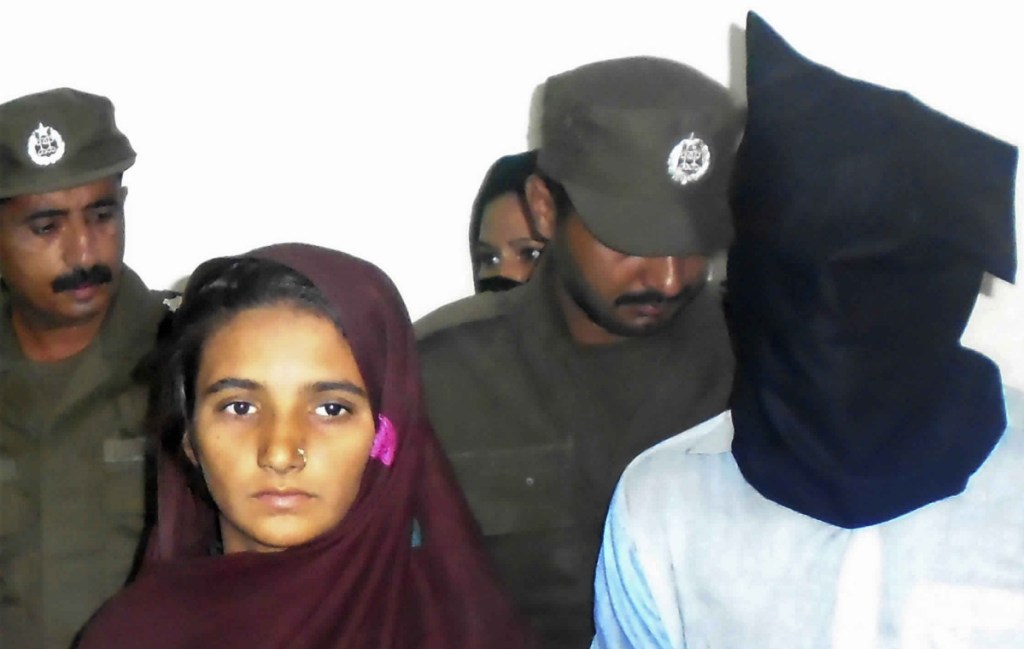ISLAMABAD, Pakistan — For years, Asia Bibi has been the invisible victim and villain of a high-profile drama that has divided this Muslim-majority nation, set off a chain of violent events and focused world attention on the power of religious extremism and its challenge to the Pakistani state and its powerful security forces.
Now, with the Supreme Court dismissing an appeal by Bibi’s religious opponents on Jan. 29, the illiterate Christian peasant woman is finally free – more than eight years after she was imprisoned and sentenced to death for committing blasphemy while arguing with Muslim workers in a berry field because she touched a bucket of water.
“She is free to go anywhere, or to stay in Pakistan under the protection of the state, for the rest of her life,” the country’s foreign minister, Shah Mehmood Qureshi, told the BBC in London on Wednesday.
But Bibi, 51, whose lawyer said she is in the process of being flown to Canada, remains a silent prisoner of circumstance. She has been held incommunicado at an undisclosed location – most likely a safe house in the capital – ever since she was first acquitted by the high court in October and released from a women’s prison in Multan city, where she had been on death row.
“There is no way she can stay in Pakistan,” the lawyer, Saif ul Malook said in a lengthy interview Wednesday. He said her husband, two grown daughters and several family associates have already relocated to Canada, with support from the Ottawa government and local Christian churches.
Even though Bibi has been cleared twice of all charges, her plight has only exacerbated the religious and political turmoil surrounding the volatile issue of blasphemy, a capital crime in Pakistan and a frequent excuse for the harassment of religious minorities. Accused blasphemers risk being pulled from jail and lynched by frenzied mobs or even by prisoners or guards.
The high court has now issued two exhaustive, blistering rulings in her case, denouncing the evidence against her as a concoction of lies and contradictions, but the justices took pains to focus on purely legal flaws in the prosecution and to avoid raising the issue of blasphemy itself. The closest they came was when one justice demanded of her religious antagonists, “Is this the face of Islam you want to show the world?”
The religious groups that agitated for Bibi’s execution have been showing increasing muscle in the past year. They staged disruptive protests for weeks in late 2017 and launched days of violent mayhem after she was acquitted last October, calling for mass uprisings against civilian officials and even a military mutiny. The government finally agreed not to let her leave the country during the appeals process, which critics denounced as a dangerous capitulation to extremism.
Since then, the agitators have been temporarily brought to heel. Their top leaders are under arrest and several have been charged with sedition and terrorism. In a ruling Wednesday stemming from the 2017 protests, the Supreme Court admonished the government to be more vigilant against “preachers of hate and extremism,” saying they should “never be pampered; instead they should fear the state.”
But the group that spearheaded the protests, led by clerics from a mainstream Sunni Muslim school, still commands the large popular following it built partly by extolling violence in connection with her case.
In 2011, after Salman Taseer, the Punjab provincial governor, spoke up in Bibi’s defense, he was assassinated by his bodyguard, Mumtaz Qadri, who said he was acting in defense of Islam.
Qadri was executed for murder in 2016, but meanwhile the group built a cult of martyrdom around him and used it to enter politics. In a stunning election upset, it outranked all other religious parties and placed fourth among all national parties in contests for several parliamentary seats last year. Its members are active on social media, and have called for Bibi to be hunted down and killed.
“The acquittal of Asia Bibi and its upholding by the Supreme Court are important developments, and we are happy that her long ordeal has ended, but it is very sad that she cannot live in her own country,” said Tahir Naveed Chaudhary, chairman of the Pakistan Minority Alliance. “If the extremists are so powerful that they can kill people like Governor Taseer, who can guarantee the protection of a poor soul like Asia Bibi?”
Malook, her lawyer, who fled to Europe last October after saying he received death threats when Bibi was first acquitted, returned two weeks ago to represent her in court again. A career criminal attorney who also served as a special prosecutor in the trial of Taseer’s assassin, Malook said he is fearful of being killed, but that he does not want to leave his family or seek permanent asylum abroad.
“I want to keep traveling here and representing people like her. I want to keep doing that for the rest of my life,” he said. “But if something happens to me, nobody will dare touch another such case for 100 years.”
Copy the Story LinkSend questions/comments to the editors.



Success. Please wait for the page to reload. If the page does not reload within 5 seconds, please refresh the page.
Enter your email and password to access comments.
Hi, to comment on stories you must . This profile is in addition to your subscription and website login.
Already have a commenting profile? .
Invalid username/password.
Please check your email to confirm and complete your registration.
Only subscribers are eligible to post comments. Please subscribe or login first for digital access. Here’s why.
Use the form below to reset your password. When you've submitted your account email, we will send an email with a reset code.